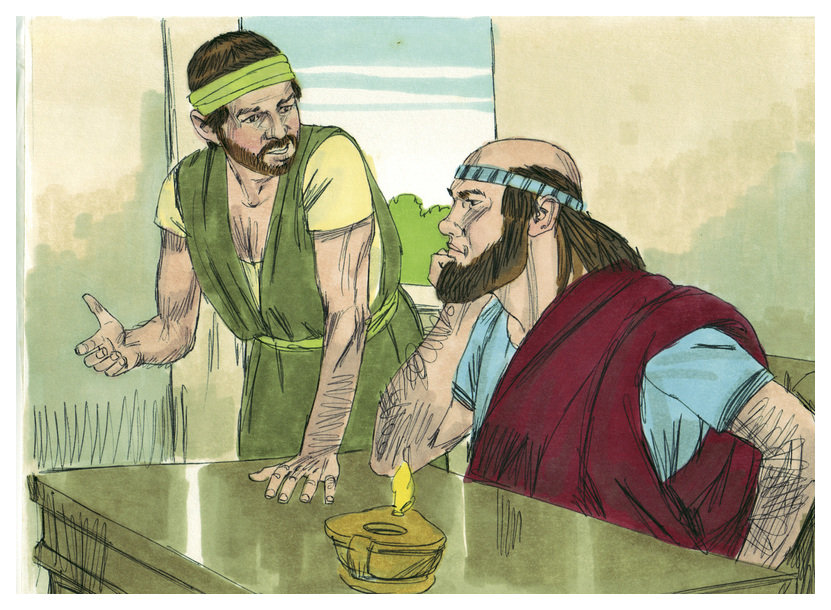Now the king was talking with Gehazi the servant of the man of God, saying, “Please tell me all the great things that Elisha has done.”—2 Kings 8:4.
Sometimes two stories intertwine so closely it is impossible to tell one without telling the other. We think of Romeo and Juliet, Damon and Pythias, Antony and Cleopatra. In the Bible, we have Cain and Abel, Jacob and Esau, David and Saul, Elijah and Jezebel among others. As Gehazi is about to demonstrate, it is impossible to tell of the ‘great things that Elisha has done’ without mentioning the Woman of Shunem. Make no mistake: Elisha did many great things. Only Jesus himself, in all of scripture, performed more miracles than Elisha. And as Gehazi recognized, the Woman of Shunem occupied a central, though subdued, role in Elisha’s ministry.
And two of his greatest miracles would not have taken place but for the perception, initiative, and persistent hospitality of the Woman of Shunem.
One day Elisha went to Shunem, where there was a prominent woman; and she persuaded him to eat bread. So it was, that as often as he passed by, he turned in there to eat bread.
She said to her husband, “See now, I perceive that this is a holy man of God who passes by us continually. Please let us make a little room on the roof. Let us set for him there a bed, a table, a chair, and a lamp stand. When he comes to us, he can stay there.”—2 Kings 4:8-10.
Early in his ministry Elisha encountered this ‘prominent woman,’ the Woman of Shunem. We are not told what made her prominent, although subsequent events reveal that her husband must have been a man of significant property. But many rich wives focus on their own needs. This woman would have been prominent even if penniless, for she demonstrated insight and initiative—and hospitality. She persuaded Elijah to dine in her home. Not only that, but to stop and eat with her and her husband whenever he passed through Shunem.
She tells her husband that she perceives Elisha to be a “holy man of God.” Recognizing that God is blessing Israel through Elisha, she wants to support that work fully. Not content with merely providing food, she persuades her husband to construct a small apartment, or flat, with all the amenities, just for Elisha.
As anyone who travels the same route repeatedly knows, having such a haven is a great blessing. And we recognize that quiet souls like the Woman of Shunem are constantly at work in the background, easing the burdens and lightening the load of those, like Elisha, whose ministry is much more visible. But those quiet souls are, in their own way, as much a part of the miracles as the prophet who performs them.
It happened on one of those visits, as he relaxes in his private apartment, Elisha, recognizing the great blessings this woman has provided, decides the time has come to recognize and reward her. A tiny village, distant from the capital of Samaria or a fortified city, Elisha offers to use his influence with the King, or the royal army on her behalf.
One day he [Elisha] came there, and he went to the room and lay there. He said to Gehazi his servant, “Call this Shunammite.”
When he had called her, she stood before him. He said to him, “Say now to her, ‘Behold, you have cared for us with all this care. What is to be done for you? Would you like to be spoken for to the king, or to the captain of the army?’”
She answered, “I dwell among my own people.”—vv. 11-13.
Content with her lot, living among people she knows an trusts, she has neither the need nor ambition for royal attention. In Elisha’s day, just as in our own, those who give, truly give, with no strings attached, are rare jewels. The Woman of Shunem proves herself to be one.
Ralph Waldo Emerson said:
You cannot give anything to a magnanimous person. After you have served him, he at once puts you in debt by his magnanimity.
The Woman of Shunem embodies Emerson’s statement. At her own initiative, she has provided Elisha with food, shelter, and rest—and even more important, with hospitality. One can purchase food, shelter, a bed—but hospitality, making one feel comfortable when not at home, is a gift. And when Elisha suggests possible compensation, she demurs. She does not need or desire what he offers. But God can provide what man cannot.
He [Elijah] said, “What then is to be done for her?”
Gehazi answered, “Most certainly she has no son, and her husband is old.”
“She has no son, and her husband is old.”
By now we recognize the circumstance as a familiar one. Wealthy or not, uncertainty clouds this woman’s future. Without a son, and her husband aging, she soon will be without human support. Everything provided by her husband will have to be paid for after his death. So even with wealth, her situation remains somewhat precarious—as we shall soon see. Such realities might have made a lesser person self-focused. But in the woman of Shunem we see no insecurity, no anxiety for self-preservation. If she longs for a son, she has not indicated it. On the contrary, she declares herself content. Apparently, she has made peace with her status.









